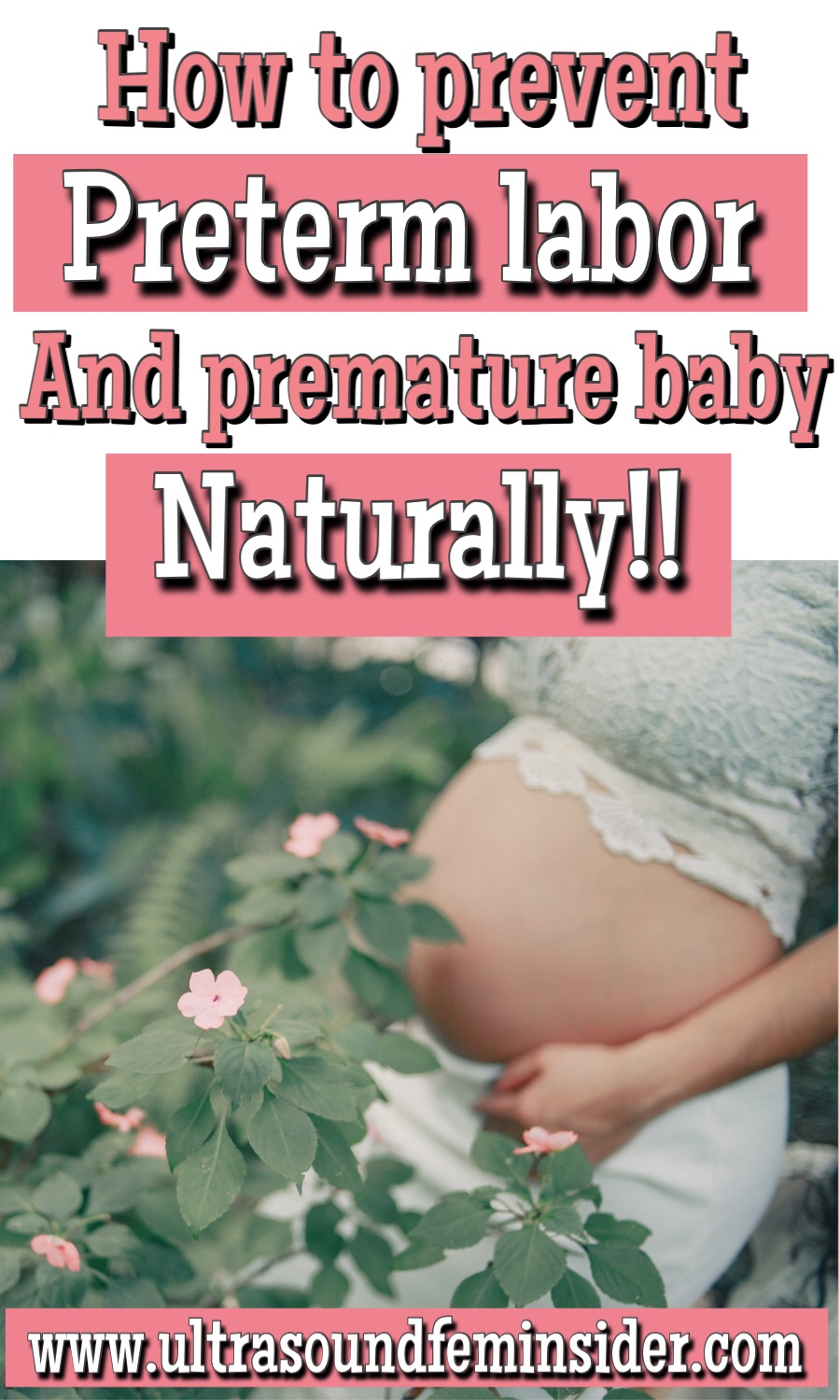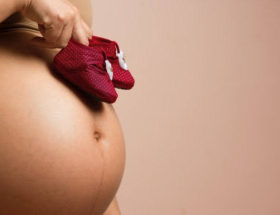Having a premature baby is one of the most difficult experiences that you can face as a parent. The anguish of seeing your baby in NICU for weeks, sometimes even months before being able to take him home, must be difficult and traumatic for any parent. Unfortunately, the statistics are alarming, according to the Center for disease control and prevention in 2018, 1 out of 10 babies was born prematurely in the United States. Despite the fact that premature births are high, there is good news, and that is that preterm birth rates decreased from 2007 to 2014. In this article, I will give you all the information you should know about premature babies and ways to prevent having a premature baby in a natural way.
What is considered preterm labor?
Preterm labor occurs when uterine contractions start before 37 weeks of pregnancy, followed by cervical dilatation (thinning and effacement). There are different categories to catalog the preterm labor.
- Extremely preterm: Occurs with less than 28 weeks.
- Very preterm: Occurs from 28 to 32 weeks.
- Moderate to late preterm: Occurs from 32 to 37 weeks.
Now you should know that from approximately 30 weeks the uterus begins to prepare for the birth process through the Braxton hicks contractions. How to differentiate the Braxton hicks from the actual real contractions. Here a list the difference for you:
Braxton hicks contractions characteristics.
- They don’t happen at regular intervals
- Braxton hicks are not painful
- May change or completely disappear if you change position or activity
- They don’t last long or feel strong
- Don’t get closer together
Real labor contractions.
- Real contractions come at regular intervals of time and as time goes on, they get closer and stronger
- They start with cramping, followed by increasing pelvic pain that starts to radiate to the lower back
- The pain and discomfort will not disappear no matter what you do
- Despite what you do, as the time pass, they’ll get stronger, closer and more painful
Causes Of Preterm Labor.
Spontaneous preterm labor: This is the unplanned delivery before the 37th week of pregnancy. This could be triggered by an inflammation or infection of the membranes
Medically indicated preterm labor: A medical condition such as preeclampsia could force your doctor to recommend preterm delivery via induced labor
non-medically indicated preterm labor: This is the condition in which labor has been induced or a C-section has been carried out. But without a medical emergency.
Risk factors of preterm labor.
- History of incompetent cervix, and / or having premature pregnancies before
- History of previous miscarriages (less than 18 months have passed since the last pregnancy)
- Family history of Prematurity
- Advanced maternal age (over 35 years old)
- Multiple pregnancies (twin or more babies)
- Having a pregnancy under 17 years of age
- History of diabetes or high blood pressure
- Pregnancy was achieved through Invitro fertilization
- History of previous surgeries in the cervix (Leep or cone biopsy)
- Clotting disorder or thrombophilia
- Recurring kidney or bladder infections
- Urinary tract infections, sexually transmitted infections, and/or history of recurrent vaginal infections
- African-America ethnicity
Lifestyle-related Risks For Preterm Labor.
These following lifestyle risk factors can lead you to have preterm labor without the presence of any medical condition.
- Smoking.
- Drinking alcohol.
- Illegal drug use.
- Little or absence of prenatal care.
- Domestic violence, such as emotional, physical, and sexual abuse.
- High levels of stress.
Signs and symptoms of preterm labor.
- Uterine contractions (tightens sensation of the belly) that don’t go away, they start to occur every 10 minutes or more often.
- Change on vaginal discharge: Leaking fluid or having abnormal bleeding through the vagina.
- Increasing pelvic pressure: This feels like if the baby is pushing down on your vagina.
- Low and/or dull Backache cramps that feel like a menstrual period.
- Abdominal cramps or colic, This symptom may occur with or without diarrhea.
Pin the post here!

Now, let’s talk about the baby who survives preterm labor.
A developing baby goes through important growth throughout pregnancy, mainly in the final months and weeks. For example, the brain, lungs, and liver need the final weeks of pregnancy to fully develop. Also, babies grow throughout the entire pregnancy but mainly on the last weeks.
Babies born too early (especially before 32 weeks) have higher rates of death and disability. In 2017, preterm birth and low birth weight accounted for about 17% of infant deaths.
Babies who survive may suffer of:
- Breathing problems
- Feeding difficulties
- Cerebral palsy
- Developmental delay
- Vision problems
- Hearing problems
That is why it is very important that your baby comes to an end, to achieve normal growth and development, and normal weight at birth.
Ways to prevent preterm labor naturally.
Regardless that under certain circumstances, such as: Pre-existing conditions little or nothing is what you can do to avoid preterm labor. There are measures you can take to take care of yourself and take care of your baby, and avoid premature delivery.
Related posts you might like to read after!!
First trimester checklist, the things you need to do after finding you are pregnant.
Second trimester to-do-list, getting ready for the new baby.
All you need to know about Cervical incompetence during pregnancy.
7 excellent tips to sleep better during pregnancy.
How to prevent preterm labor naturally?
1. Visit your doctor if you plan a pregnancy.
If you want or are planning to get pregnant the first thing you should do is check with your doctor.
Rule out in advance medical conditions like diabetes, hypertension, hemophilia, infections, kidney problems, etc. It can be the difference between a completely healthy pregnancy or a risk pregnancy. But even when it is a risky pregnancy, you are prepared just like the medical professional that treats you, that way you will receive the proper attention.
2. Eat healthy.
The importance of eating healthy during pregnancy is great. There are studies that have shown that weight problems such as underweight or obesity are risk factors that can lead to premature labor.
The average normal weight a pregnant woman should gain is 25 to 35 pounds. If you gain too much, you can increase the chances of complications such as preeclampsia and gestational diabetes.
During pregnancy, you should be eating healthy foods, that are essential to the development of the baby inside your womb. Therefore, you may have to take healthy sources of dairy and protein, whole-wheat carbs, and lots of vegetables and fruits.
For more information about this topic check this link:
Pregnancy diet, what you can eat or what to avoid during pregnancy.
3. Visit your dentist regularly.
A lot of pregnant women often skip their visits to the dentist, but having regular cleanings can help avoid preterm labor. If you have untreated dental conditions, you are at higher risk of developing uterine infections.
4. Stay active if you can.
After visiting your doctor, and being certain that there is no medical condition that prevents you, exercising is the best option
Regular exercise during pregnancy benefits you and your baby in many ways:
- Reduces back pain.
- Relieve constipation, bloating and swelling.
- May decrease your risk of gestational diabetes, preeclampsia, and cesarean delivery.
- Promotes healthy weight gain during pregnancy.
- Improves your overall general fitness and strengthens your heart and blood vessels.
- Helps you to lose the baby weight before and after your baby is born.
- Improves energy, mood, and posture.
- Promotes muscle strength, tone, and endurance (important to maintain your pregnancy all the way until the end, and for the delivery day).
- Improves insomnia.
5. Keep good hygiene.
Usually, there is an increase in vaginal discharge toward the ending of a pregnancy. So, a pregnant woman must pay attention to hygiene, to decrease the risk of urinary tract infections. Severe infections would cause early fetal membrane rupture, which results in preterm labor. Thus, 100% cotton panties should be used by pregnant women.
6. Take a multivitamin capsule daily.
Daily intake of multivitamin not only improves overall health but also reduce the rate of preterm birth. Pregnant women who can’t eat rich meals may take multivitamins to compensate for nutritional deficiencies.
7. Keep yourself hydrated at all times during pregnancy.
During pregnancy, the volume of your blood increases by approximately 50%, this increase is necessary to support the pregnancy that is taking place and to carry through the placenta all the nutrients that the baby needs.
When you get dehydrated the volume of blood decrease causing an increase in a hormone called oxytocin. This increase in hormone oxytocin is harmless if is temporary, but if the dehydration spreads just like the presence of oxytocin in the blood, this can trigger uterine contractions and perhaps preterm labor eventually.
And, as if this were not enough, there is another benefit of staying hydrated to avoid preterm labor, and that is, the placenta is the organ that in addition to carrying nutrients to the baby, produces the amniotic fluid that is inside the gestational sac, if you dehydrate yourself for a long period of time, the amniotic fluid may decrease. The normal values of the amniotic fluid are 8 centimeters to 22 centimeters, if the fluid falls below 8 centimeters, the pregnancy must be monitored, and if it falls below 5 centimeters, the doctor has to perform a medicated premature delivery to preserve the wellbeing of the baby.
Symptoms of dehydration include:
- Headaches or dizziness.
- Excessive Nausea and vomiting, more than your usual.
- Very dark and strong-smelling urine.
- Dry skin and chapped lips.
- Dry mouth and nose.
- Weakness and fatigue.
- Skin losing its elasticity.
Here you have it, plenty of reasons to drink a lot of water during pregnancy.
Final thoughts about How to prevent having a premature baby naturally.
The big take away of this post is that, having a baby prematurely is a very difficult experience, but with the right attention you can have your baby healthy at the end. And even when there are medical conditions, you can prepare in advance as well as your doctor to carry the pregnancy as healthy as possible.
And, if there is no medical condition, it is also always good to take precautionary measures such as staying hydrated, feeding and exercising properly, take vitamins, and stop immediately the consumption of alcohol, drugs or smoking. To avoid having a premature delivery.
If this article helped you in some way share and comment.
Thanks for reading, I’ll see you next time.
Zadi, xo










[…] How to prevent preterm labor naturally. […]
[…] How to prevent preterm labor naturally. […]
[…] How to prevent preterm labor naturally. […]
Your blog has been very useful during my pregnancy, thank you for the information and the tips.
Thank you so much for your kind words.
Very helpful and informative, thank you.
Thanks, I am glad to help.
Hiya, I am really glad I’ve found this info. Nowadays bloggers publish only about gossips and internet and this is really frustrating. A good site with exciting content, that is what I need. Thank you for keeping this site, I will be visiting it. Do you do newsletters? Cant find it.
Hi there, i do have Newsletter, You’ll find the subscription box in the bottom of my blogs.
[…] health issues like high blood pressure and gestational diabetes. Stay away from tobacco and illegal substances, before opting for an elective C-section discuss the benefits and drawbacks with your […]